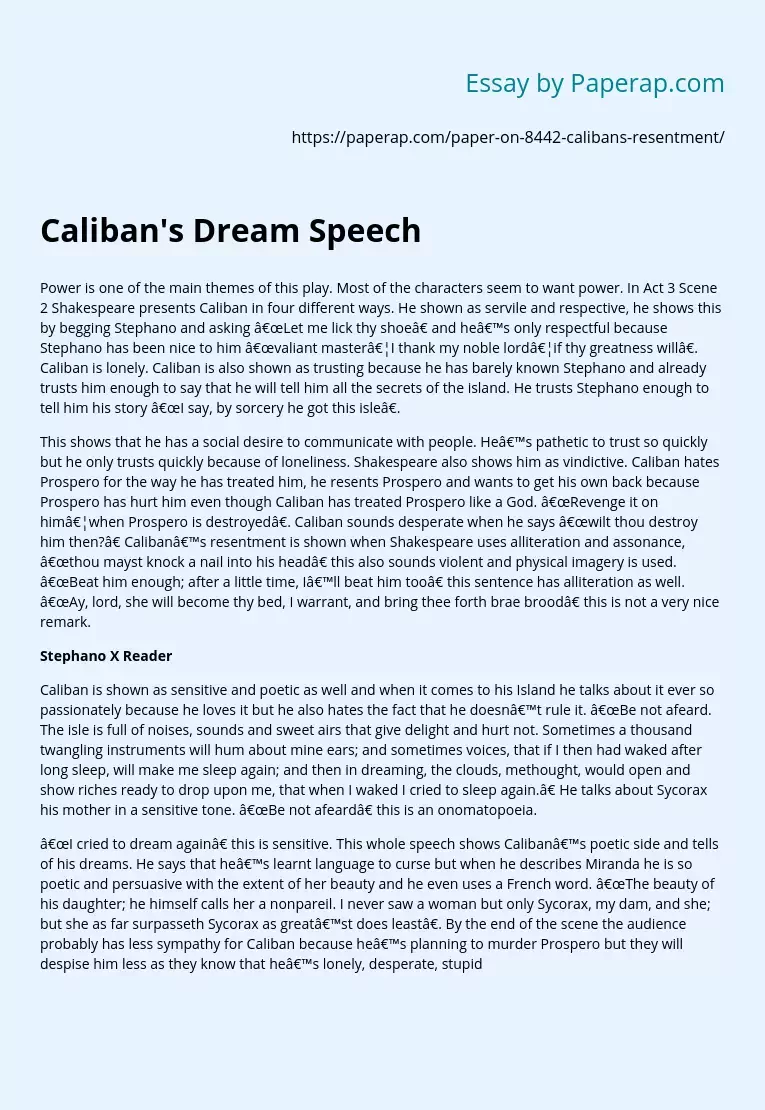Caliban's Dream Speech
Power is one of the main themes of this play. Most of the characters seem to want power. In Act 3 Scene 2 Shakespeare presents Caliban in four different ways. He shown as servile and respective, he shows this by begging Stephano and asking “Let me lick thy shoe” and he’s only respectful because Stephano has been nice to him “valiant master…I thank my noble lord…if thy greatness will”. Caliban is lonely. Caliban is also shown as trusting because he has barely known Stephano and already trusts him enough to say that he will tell him all the secrets of the island.
He trusts Stephano enough to tell him his story “I say, by sorcery he got this isle”.
This shows that he has a social desire to communicate with people. He’s pathetic to trust so quickly but he only trusts quickly because of loneliness. Shakespeare also shows him as vindictive. Caliban hates Prospero for the way he has treated him, he resents Prospero and wants to get his own back because Prospero has hurt him even though Caliban has treated Prospero like a God.
“Revenge it on him…when Prospero is destroyed”. Caliban sounds desperate when he says “wilt thou destroy him then?” Caliban’s resentment is shown when Shakespeare uses alliteration and assonance, “thou mayst knock a nail into his head” this also sounds violent and physical imagery is used. “Beat him enough; after a little time, I’ll beat him too” this sentence has alliteration as well.
“Ay, lord, she will become thy bed, I warrant, and bring thee forth brae brood” this is not a very nice remark.
Stephano X Reader
Caliban is shown as sensitive and poetic as well and when it comes to his Island he talks about it ever so passionately because he loves it but he also hates the fact that he doesn’t rule it. “Be not afeard. The isle is full of noises, sounds and sweet airs that give delight and hurt not. Sometimes a thousand twangling instruments will hum about mine ears; and sometimes voices, that if I then had waked after long sleep, will make me sleep again; and then in dreaming, the clouds, methought, would open and show riches ready to drop upon me, that when I waked I cried to sleep again.” He talks about Sycorax his mother in a sensitive tone. “Be not afeard” this is an onomatopoeia.
“I cried to dream again” this is sensitive. This whole speech shows Caliban’s poetic side and tells of his dreams. He says that he’s learnt language to curse but when he describes Miranda he is so poetic and persuasive with the extent of her beauty and he even uses a French word. “The beauty of his daughter; he himself calls her a nonpareil. I never saw a woman but only Sycorax, my dam, and she; but she as far surpasseth Sycorax as great’st does least”. By the end of the scene the audience probably has less sympathy for Caliban because he’s planning to murder Prospero but they will despise him less as they know that he’s lonely, desperate, stupid to trust others so easily, he’s been brought up as a slave and he has got a sensitive side.
In Act 4 Scene 1 Caliban, Stephano and Trinculo are near Prospero’s home. “Prithee, my king, be quiet. Seest thou here; this is the mouth o’th’ cell. No noise, and enter. Do that good mischief which may make this island thine own forever, and I, thy Caliban, for aye thy foot-licker” this little speech shows that Caliban has got everything worked out but some garments catch Stephano and Trinculo’s eyes “my king…thou king…be quiet”.
Caliban is very angry at this stage, Stephano and Trinculo aren’t concentrating on the job in hand, he’s serious about getting Prospero killed but they aren’t. Caliban gets really agitated and calls Stephano a fool “The dropsy drown this fool! What do you mean to dote thus on such luggage? Let’t alone and do the murder first. If he awake, from toe to crown he’ll fill our skin with pinches, make us strange stuff.” Caliban is scared of Prospero torturing him again. “Ay, that I will; and I’ll be wise hereafter and seek for grace. What a thrice-double ass was I to take this drunkard for a god, and worship this dull fool!” Caliban here tries to get Prospero’s forgiveness; he realises that he’s made a mistake. When you talk about grace it’s at a religious level usually but Caliban is asking for forgiveness using a religious word.
Caliban is described sometimes as a “tortoise” and at other times as a “fish” he is abused a lot because of his looks but the reader doesn’t know what he really looks like because he’s described in a lot of different ways. Shakespeare lets the reader’s mind imagine was Caliban looks like. After having explored Shakespeare’s presentation of Caliban in The Tempest. I accept that Caliban has got a dark side but he’s also got a good side, although it isn’t shown as often, he’s a sensitive being.
Caliban's Dream Speech. (2019, Dec 05). Retrieved from https://paperap.com/paper-on-8442-calibans-resentment/

